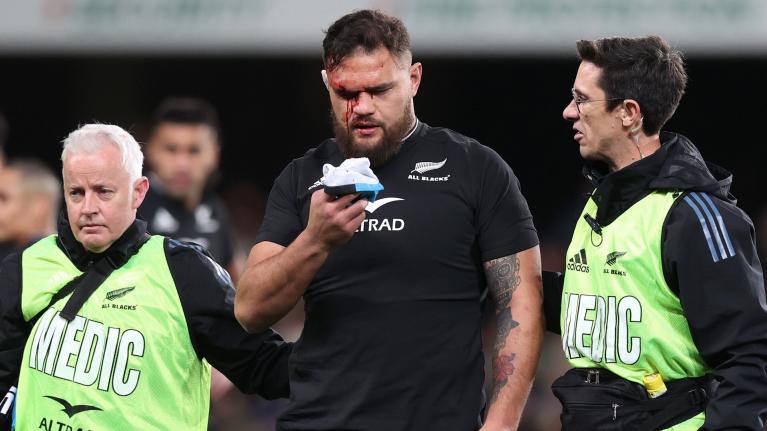'It is what it is': All Blacks have no complaints over card decisions

All Blacks head coach Ian Foster said that his side ran into a 'very desperate' Ireland side in Dunedin that was hellbent on reversing last week's 42-19 loss.
Whilst it was in the second quarter last week where the All Blacks exploded with three tries, it was a chaotic period at Forsyth Barr that saw the home side receive two yellow cards and one red.
Foster praised they way his side handled the setbacks with the team scoring right on halftime through Beauden Barrett despite holding a one man deficit. Going into the sheds down 10-7 was a bonus result for an All Black side that was under serious pressure.
"It was an Irish team that turned up very, very desperate," Foster said in his post-match review.
"Again, we had a couple of starts that were sub-standard which we've got to improve on but I love the attitude in the team through that rather chaotic quarter where things were happening with cards and everything.
"To finish where we finished that first half I thought was a real test of character for us.
"That try in the second half again hurt us and trying to play catch-up with 14 men is never easy against a really well-organised defensive team but there was probably an unacceptable amount of errors in terms of handling stuff but a lot of that was due to pressure and trying to force things and trying to create space against what Ireland were doing.
Angus Ta'avao's red card for head-to-head contact on Ireland's centre Garry Ringrose came just after Ofa Tuungafasi had been yellow carded for an early tackle on Ringrose, leaving the All Blacks down two props.
Foster said that the All Blacks had no complaints about the spate of cards during the first half.
"It is what it is. I think there'll be no one that saw it as intentional but it was certainly a head-on-head contact," he said.
"Two yellow cards previously ... the officials were reasonably clear on that. I probably don't see a lot different from Ofa tackling somebody when he accepted the dummy and then them not getting a yellow card for James Lowe on Quinn but we're not grizzling about the cards."
In the chaos of managing the absence of two props, the All Blacks first substituted blindside Dalton Papalii for Angus Ta'avao, but then substituted No 8 Ardie Savea for Aidan Ross once Ta'avao received his red card.
Because Savea was subbed due to a red card, the match officials refused to allow the All Black loose forward back into the game, a contentious ruling that has come under the spotlight after the game.
Hooker Codie Taylor admitted that he was as shocked as anyone as he was unaware of the rule in that situation and not having Savea on the field was a big loss for the side.
"To be honest, I didn't even realise at the time. I didn't know the rules - I don't know the rules," he said.
"For me, I was just in the game and thought around that whole situation with people going off, I think the leaders in those scenarios stepped up tonight - especially
that first half.
"We got pretty desperate and I think we came together pretty well but when you're down to 13 men at one point against a pretty classy Irish side, you're going to put yourself under pressure."
"He's one of the best players, if not the best player in the world at the moment. When he goes off the field, with his ability you want him on the field. I'm not quite sure what happened there - I think there's a bit of rules or something.
"You want all your men on the field, of course, but someone of that calibre, you definitely want on the park."
All Black halfback Aaron Smith said it was skill execution, not defensive pressure from Ireland, that ultimately cost the home side.
The scoreboard pressure Ireland had built did play apart and they closed the game out on top of that.
"Not exactly. I think playing with 14 men is pretty tough for a large period of that game," Smith said.
"We knew we were going to have to be a lot better. There were a lot of things we could control with our clean outs, our ball carry, and like I said, around our skill execution of forcing things maybe.
"We were just a bit off. They really put us away. They had that scoreboard pressure, that 10-point buffer, had us have to start playing a bit more."
Latest Comments
I want to do this because it helped me and I’m recommending SWIFT HACK EXPERT RECOVERY SERVICES (swift1@cyberservices.com Or WhatsApp +1-845-224-5771) to everyone who has been a victim of these cryptocurrency binary investment scams currently going on right now. I was a victim of it and I was ashamed of how I lost 821,000 AUD to these people pretending to be forex and binary traders. My family almost left me and I was going to lose everything until I came across SWIFT HACK EXPERT RECOVERY SERVICES online who are experts in recovering cryptocurrency funds from these scammers. This special group of professional tech team was able to recover my money in six hours. I’m really glad such a group exists and I’m happily sharing this out there with anyone who needs their service to recover their money or investment coins . You can contact them at Email: swift1@cyberservices.com Or WhatsApp +1-845-224-5771
Go to commentsRuder Cyber Tech Sleuths is here to help if you've experienced scams, phishing, or accidental transactions. We recognize the urgency and emotional impact of losing your digital investments, so we focus on transparency, efficiency, and client satisfaction.
Go to comments